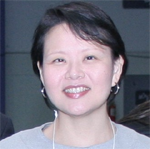The lectures will have simultaneous translations in Portuguese, English and Spanish.
SciELO Network Meeting
09:00 – 09:30
Opening Remarks
SciELO in Perspective 

Abel L. Packer »»
SciELO Program
After 15 years of operation, the SciELO Program continues to be guided by its original objective of contributing to the advancement and visibility of academic research by means of improving quality journals published by the countries which participate in the SciELO Network. Having as its governing principles the monitoring of the quality of the management and processes of scholarly communication and Open Access publishing, the journals, collections and the SciELO Network itself have obtained notable results in increasing the visibility of the research they publish, and in the development of functions and infrastructures for indexing and publishing. Nevertheless, to continue making progress, guided by the same principles and objectives, both the journals and the collections must unite their efforts to update government and institutional policies, and methodologies and technologies of communication in order to overcome the barriers and challenges that limit the professionalization, innovation, internationalization and sustainability of the management and operation of the processes of editing, publishing and dissemination of journals. Working in a network with common solutions and services in accordance with the state of the art, and broadening and reinforcing the presence of the journals in the international flows of scholarly communication, are governing principles for the advancement of the SciELO Network Program.
09:30 – 10:30
SciELO Network Update
Coordinator: Elena Primo »»
SciELO Spain
SWOT analysis 

Edgar Prieto »»
SciELO Colombia
Ana Maria Alvarez Lage »»
SciELO Argentina
Marcela Aguirre »»
SciELO Chile
Webometrics analysis 

Isidro F. Aguillo »»
Cybermetrics Lab – CCHS
The current revolution in research assessment is due to a series of factors that have been present for several years but that now are converging for offering a new scenario where the Open Access initiatives, the institutional repositories, the portals of journals and the researchers individual web presence are to play a very important role. Webometrics long ago anticipated many of the theoretical and practical novelties and its tools are still valuable for describing the new scientific and social processes that are affecting not only to the academia but to all the actors linked in one or other way to the scientific advance, dissemination of the activities, popularization of the results and the socio-economic of the implementation of the innovations.Altmetrics proposals are deeply rooted in the contributions of the webometrics pioneers and, taking aside the hype of the manifesto, analyses of links and mentions are still the most feasible approaches for collecting and analyzing the empirical evidence. While APIs are still absent or severely cut for many social tools, the commercial search engines are still by far the largest databases available and ready to be used with tested and reliable webometrics techniques.The presentation is using the three largest iberoamerican Open Access Portals (SciELO, Redaly and Dialnet) to show and test the webometric possibilities for describing and analyzing their global impact.
Consumption of information and evaluation criteria: the performance of national journals 

Rogério Mugnaini »»
Universidade de SĂŁo Paulo
The exploratory analysis of the bibliographic references of articles over time allows an estimate of the consumption of information in the diverse areas of knowledge, revealing
the most prevalent document types in each subject area, as well as their obsolescence.
Knowing these aspects, and observing these peculiarities, the academic communities in each of the diverse areas are challenged to enhance their complex system of evaluation, which formalizes itself by defining specific criteria.
The analysis of the consumption of information in Brazilian academic journals indexed in SciELO and of the documents in the subject areas of Qualis PeriĂłdicos (the Qualis Journals Evaluation System) provides relevant and important information for the improvement of Brazilian academic policies.
SciELO Chile evaluation 
Patricia Muñoz Palma »»
SciELO Chile
The principal findings of the evaluation of SciELO Chile, carried out in 2012, are presented. The historical context in which SciELO Chile emerged is presented along with the evaluation methodology and the results. The quality and the international visibility of the SciELO-Chile collection is gauged. The research efforts of Chilean researchers are characterized by subject area and are compared to the subject area specialization of the SciELO-Chile collection. The impact of the journals that make up the SciELO -Chile collection is measured and their degree of internationalization is gauged. The presentation is complemented with highlighting the role of SciELO on other regional projects in full text editing, a walk through the conclusions of the evaluation carried out, and future challenges that will be faced by the SciELO Network and SciELO-Chile. The impact of the SciELO-Chile collection is measured by different aspects such as: the implementation of electronic publishing, the development of Open Access, the quality of the journals indexed, the real use of the collection, user satisfaction, and the efficiency of the components that make up the SciELO methodology.
10:30 – 11:00
Coffee break
11:00 – 13:00
11:00 – 13:00 – The SciELO Platform: Indexing, Publication and Interoperability
Coordinator: Cristiana Agapito »»
SciELO Portugal
Quality control of indexing 

Fabiana Montanari »»
SciELO Program
The selection of journals for admission into the national and thematic collections is one of the essential functions of the SciELO Program which facilitates identifying quality journals to be indexed and which, as a result of being admitted and indexed, improve their editorial management and adherence to the recommended norms and practices of scholarly communication. The selection process is carried out by each country with the support of the academic community in order to promote the comprehensive coverage of subject areas and transparency of the evaluation processes, thus complementing the international indexes. The development of the capacities and capabilities of editing and academic publishing is part of and contributes to the progress of national research.
Preparation of texts in XML, HTML, PDF and ePUB 

Solange Santos »»
SciELO Program
The SciELO Program has been promoting the professionalization of the editorial processes of the journals by adopting state-of-the-art solutions and services in scholarly communication. In this context, considering the benefits to be gained from the implementation of the journal production flow in XML, as well as the flexibility and re-usability offered by this format, SciELO adopted the mark-up of full text in XML to produce the source content that is used in the storage of data, online publishing and interoperability. The implementation of XML in the journal production flow, in addition to opening possibilities for the inclusion of journals in Pubmed Central, allows for the enrichment of the texts with a detailed identification of the elements of the article, which makes possible their proper presentation on different devices. The availability of the full text of SciELO journals in XML, HTML5, rich PDF and ePub is one of the principal action lines of innovation and development of the SciELO system of publication.
Online management of manuscripts 

Adriana Luccisano »»
SciELO Program
One of the priority services that the SciELO Program promotes and implements is the online management of article submissions. This is carried out by means of tools which monitor submission flows, the evaluation process and the statistics which relate to the processes carried out. The introduction of systems for the online management of article submissions represents a step forward in the development of the capabilities and capacities of national journals by facilitating the management and operation of publishing flows, and by reducing the operational and infrastructure costs, and the time between the submission and publication of an article. Currently, SciELO offers two systems at no cost to the journal: Open Journal System – OJS from PKP, and ScholarOne from Thomson Reuters. The adoption of an online management system is essential for the advancement of the state of the art of Brazilian journals.
Technology platform 

Fabio Batalha »»
SciELO Program
During its 15 years of uninterrupted operation, SciELO has been constantly improving its applications and services in line with international standards in open access scholarly publishing, and in many cases being a pioneer in the application of some of the technologies. Currently, to keep up with the evolution of systems for the dissemination of information, it has become necessary for the integration amongst applications to be automatic and transparent. The dissemination of content goes beyond the use of Web sites, portals and protocols, such as with the use of API’s (Application Programming Interfaces) that enable various users, institutions and applications to use content in distinct and different ways, giving a more comprehensive view of it and generating value added both for the content provider and for users.
SciELO Books 

Adriana Luccisano »»
SciELO Program
SciELO Books represents a resource and common space for products, services and events which are geared towards the development of capacities and infrastructures of indexing, publication, interoperability and dissemination of academic book collections. The development and operation of SciELO Books is carried out in a cooperative network structure involving the publishers and participating institutions. The SciELO Books Network interoperates and shares its objectives, resources, methodologies and technologies with the SciELO Network of academic journals in order to contribute to the development of scholarly communication in both of these publication formats.
Training program for editors, reviewers and authors 

Patricia Logullo »»
Palavra Impressa Editora
While some academic journals indexed in the SciELO database already have a high level of professionalism and systematization of editorial procedures, others still have difficulties in managing the flow of the selection and publication of articles, in obtaining financing, setting standards and working principles. The centralization of power and work in the hands of the editor or a few subeditors, and lack of standardizing working methods can help to make the quality of articles more heterogeneous within each journal and compared to various journals of reference. The experience of the most successful academic journals shows that the establishment of clear and detailed standards for authors is essential, but it is not enough to ensure the quality of the publication, such as if there is not a well-reasoned system of assessment of the material received for publication.
The presentation will address the problems and difficulties faced by editors of academic journals and topics that should be part of a training program geared to editors, reviewers (referees) and staff of the journals indexed in SciELO. The lack of familiarity with sensitive issues such as article evaluation protocols, electronic systems for submissions, Impact Factor and citation stacking, XML mark-up, performance metrics and others, can contribute to the delay in the improvement of the performance of the journals. A training program will be set up by SciELO for the editors of the journals to clarify the quality criteria used in the evaluation of journals and how these criteria are reflected in journal performance. This initiative aims to train the editors in the management of journal teams in any academic field and not only those of their training or specialization, in order to meet the objective of applying one common methodology for the preparation, storage, dissemination and evaluation of academic output.
13:00 – 14:00
Lunch
14:00 – 14:30
Libraries and the Evolution of SciELO Journals
Coordinator: Susan Veldsman »»
SciELO South Africa
How libraries can help in the improvement of journals – USP 
Sueli Mara Ferreira »»
SIBi – USP
How libraries can help in the improvement of journals – UNAM 

José Adolfo Gallardo »»
Universidad Nacional AutĂłnoma de MĂ©xico – UNAM
Libraries are the great purchasers of research journals, and it is for this reason that they are very much aware of the price they must pay to obtain these items. They are also conscious of the important position that they hold both as disseminators of knowledge and of the fundamental role they play in the creation of new knowledge. That is to say, it is libraries that bring together a wide range of journal titles which represent different approaches depending on the background which each researcher brings to tackling a particular academic problem. In addition to acquiring them, journals must be stored and organized so that they can be used when the articles contained in each one of their issues needs to be consulted. These journals have benefitted from indexes so that the information they contain can be accessed quickly and accurately. This has brought about a realization that languages are required which will allow them to be located efficiently. These languages may take the form of subject headings, single entries, and keywords or whatever name is given to the process of assigning a subject designation to each article. Libraries have employed various ways of sharing information. These range from Interlibrary loan to offering academic output in Open Access; sending a copy of each work, be it as a Xerox copy, a microfilm, a CD or any other format. In the developed countries, the use of bibliometrics has been a key driver as one of the tools used to evaluate academic output in their universities and research centers. International indexes provide good coverage of the Natural Sciences, and it is here that Latin American scientists who publish in peer-reviewed international journals can be found. Academic output in the Humanities and Social Sciences does not benefit from the same coverage because such output is published in local journals in Spanish or Portuguese. Because of this, SciELO has emerged as an option for the analysis, evaluation and dissemination of academic output produced in the region. And, it should be noted that all areas of knowledge are covered. University and research libraries are those that are most interested in the emergence of SciELO because it represents an important option for the dissemination of the national and regional output produced by Latin American academics. To know what is specifically published in each country and in Latin America in general has facilitated an awareness of regional academic output and makes it possible to have various options for measuring and quantifying the impact of each work and of the output of a particular author. This process of measurement allows an author’s output to be treated in different ways. With the emergence of university rankings , the work carried out by SciELO takes on a greater dimension. The work that has been developed by this network has allowed academic output to be recast. This being the case, it is very important for university libraries that authors, who are also library users themselves, be viewed and assessed in a different way based on hard data and not simply on subjective criteria.
14:30 – 15:30
Management of Journals and SciELO
Coordinator: Carlos Agudelo »»
SciELO Colombia
Production modes based on decentralized, collaborative and networked structures 

Viviana Martinovich »»
Revista Salud Colectiva
In this presentation we intend to relate part of the publishing experience of the journal Salud Colectiva, an academic journal of the Universidad Nacional de LanĂşs (Argentina), and address the publication modality proposed by SciELO 15 years ago which brought great visibility to academic output, based on openness and free full text content on the Internet and on the implementation of an appropriate language so that the contents were not only clear and legible to a human reader but also to electronic systems of information. So, a collaborative structure was formed in which information is generated in a decentralized fashion, and in which authors and editors/publishers are an essential part of the mechanism of the elaboration of data and metadata that circulate through the SciELO network. Therefore, we believe that the challenge for the future will be to give visibility to this mode of publication in order to generate tools that permit the integration of all of the actors in this, and strengthen the editorial practices in the region.
The Current situation of Venezuelan journals in the SciELO Network 

Ana Ruiz »»
Revista Facultad de Ciencias Veterinarias
The functions of editors and of the Consejo Editorial de las Revistas CientĂficas Venezolanas (The Editorial Board of Venezuelan Academic Journals) are carried out by the professors and researchers of the institutions to which the respective journals are affiliated, since there is not in existence minimum requirements in the personnel that would normally carry out these functions and who would conform to what has been laid out by SciELO.
In our particular case, our journal is deposited jointly in the SciELO Network and in the institutional repository of the Universidad Central de Venezuela (http://saber.ucv.ve/ojs/index.php/revisfcv). This has contributed to increasing the visibility of the products published by this disseminating body, bringing as a result an increase in the number of authors from other countries, such as Brazil, Colombia, Nigeria and Argentina among others.
Revista Lusófona de Educação 
António Teodoro »»
Revista Lusófona de Educação
The goal of making the Revista Lusófona de Educação (RLE) an international journal, present in the principal indexes in the world, was achieved in its first 10 years of publication. And we achieved this as a journal published only in Portuguese. In issue nº 24, coming out this month of October, we are introducing a meaningful innovation: RLE will be published in four languages: Portuguese, English, Spanish and French. It was an informed decision which reflects the cosmopolitan nature of academic output and takes on the defense of these four languages as languages of scholarly communication (and not only English). The presentation emphasizes the risk of considering English as the only language for scholarly communication, and defends the position that SciELO can be an important way to value and increase the visibility (Impact Factor) of academic output presented in Portuguese and Spanish.
We will seek to reflect upon the aspects related to the following topics 

Teresa Cristina Rego »»
Educação e Pesquisa
We will seek to reflect upon the aspects related to the following topics: 1. Qualitative and quantitative methods of evaluating and communicating academic output, and the specific characteristics of the Humanities and Social Sciences; 2. Professionalization of the editorial management of journals: challenges and perspectives; 3. Dimensions and dilemmas of internationalization in the contemporary scenario. The analysis will be based on my experience as the Editor-in-Chief of the Revista Educação e Pesquisa (Journal of Education and Research) of the Department of Education of the Universidade de São Paulo (USP), and also as a member of the academic committee of SciELO (in the Humanities and Social Sciences) responsible for the evaluation of journals for their admission into the SciELO collection, and for their retention. In this role I have not only the responsibility of representing the aspirations of the wider academic community, but also of getting to know and collaborating to solidify some of the action lines and goals for the development of the SciELO Network.
The current and future importance of the SciELO index in the raising of quality and visibility of Brazilian journals 

LuĂs Reynaldo FerracciĂş Alleoni »»
Scientia Agricola
In this presentation, the contribution of SciELO over the past 15 years will be highlighted and future actions will be suggested with a view to increasing the quality and visibility of the journals. The following activities will form part of these actions: the dissemination of modern computerized systems for the management of routine journal processes; the growth of joint activities with other international databases; the introduction of SciELO into government committees in the classification of journals; and the joint promotion, with national associations of journal publishers, of training courses and of the professionalization of publishers to improve their management of journal editorial processes.
15:30 – 16:00
Coffee break
16:00 – 16:45
Lines of Action to increase the visibility of journals and collections of SciELO Network (2014-2016)
Coordinator: Abel L. Packer »»
SciELO Program
Margarita Ontiveros y Sánchez de la Barquera »»
CONACYT 
Patricia Muñoz Palma »»
SciELO Chile
16:45 – 17:00
Closing Remarks
Abel L. Packer »»
SciELO Program
19:30 – 20:30
Cultural Presentation
A Barca
09:00 – 09:45
Opening Ceremony 
Coordinator: Celso Lafer »»
FAPESP
Carlos Henrique Brito Cruz »»
FAPESP
Bhanu Neupane »»
UNESCO
Sigmar Rode »»
ABEC
Anita H. Straus »»
Rogério Meneghini »»
SciELO Program
Abel L. Packer »»
SciELO Program
09:45 – 10:30
Opening Conference
Coordenador: Carlos Alexandre Netto »»
UFRGS
Open-Access publishing and the transformation of scholarly communication 

Mark Patterson »»
eLife
The past 15 years has seen the emergence and development of open-access publishing as a major new mode of scholarly communication. It is defined by free and immediate access to publications, coupled with the removal of reuse barriers so that new research findings can have the maximum value and reach for further research, education and the benefit of society. Despite strong progress, open-access publishing remains a minority activity, although disruptive forces are emerging that have the potential to drive greater transformation. Perhaps the strongest brake on the growth of open-access publishing is the academic reward system, which places emphasis on established journal titles and journal-based metrics in research assessment practices. One of the keys to further progress is therefore to regard open access as one aspect of a broader set of reforms in scholarly communication.
10:30 – 11:00
Coffee break
11:00 – 12:30
Policies in Research and Scholarly Communication
Coordinator: Ricardo Lourenço »»
MemĂłrias do Instituto Oswaldo Cruz
Panel
FAPESP and scientific communication 

Carlos Henrique Brito Cruz »»
FAPESP
The SĂŁo Paulo Research Foundation created the SCIELO project and has been supporting it since 1998. The project allowed the foundation to have a positive impact in the quality of scientific journals edited in Brazil and in their impact. FAPESP is now considering more focused policies, aiming at raising the impact of some of the journals in SciELO, working together with other state funding agencies in Brazil. We will describe this and other initiatives in Scientific communication.
SciELO South Africa: implementation of policy advice by an academy of science 

Robin Crewe »»
University of Pretoria
The Academy of Science of South Africa has published two evidenced based studies on scholarly communication, one on scholarly journals (2006) and the second on scholarly books (2009). Both made significant recommendations for the development of policy.
The establishment of SciELO South Africa was seen by the academy as a key response to government’s request to implement the recommendations of the two studies. This OA platform serves as the basis for strengthening the impact, visibility and quality of South African journals and hence to enhance the impact of scholarly work from an emerging country.
Together with the Department of Higher Education and Training, the Academy is assisting with the implementation of “the policy and procedures for the measurement of research outputs of public higher education institutions”. The interaction between SciELO SA and South African policies on research and scholarly communication and the related incentives will be discussed.
12:30 – 14:00
Lunch
14:00 – 15:30
Trends and Innovations in Scholarly Communication
Coordinator: José Adolfo Gallardo »»
Universidad Nacional AutĂłnoma de MĂ©xico
Opening Presentation
Empowering authors with Altmetrics 

William Gunn »»
Mendeley
This talk will cover emerging trends in scholarly communication over the past decade from the perspective of the early-career researcher, librarian, and tech community. Developments such as social networking, altmetrics, and automated knowledge engineering will be discussed in the framework of the transformative effect of the web. I will describe how Mendeley and other open platforms are changing scholarly communication practices & go into some detail on how this helps authors, particularly early-career researchers, get more recognition for their work. The relationship between open access and altmetrics will be examined in some detail.
Panel
Focusing on the individual: find, build, suggest 

Anurag Acharya »»
Google Scholar
Much of scholarly communication is centered around individuals. As researchers, we explore other work by authors of interesting articles, as editors, we seek out reviewers knowledgeable in particular areas, as funders, we look for researchers with a proven track record. I will present features in Google Scholar that focus on the individual researcher. I will describe our approach to author disambiguation which allows even prolific authors to quickly set up a profile with all their articles. I will present integration of individual author profiles into Scholar search results which make it easy for users to explore other work by key authors. Finally, I will describe our personalized recommendations which analyze an author’s publications to automatically identify recently published articles that are likely to be of her interest.
Megajournals and other innovations in academic journal publishing 

Hooman Momen »»
World Health Organization
Since the widespread implementation of online journals and the introduction of open access more than a decade ago, the pace of innovation in academic journal publishing has been slow. More recently however a number of innovations have appeared in journal publishing, which have the potential to cause far reaching changes in how we communicate scientific information. Among these trends is the raise of Megajournals and in particular PLoS ONE which have within the last few years come to dominate open access journals. These journals although peer reviewed for scientific and methodological soundness accept a wider variety of articles as questions such as “How important is the work” or “is it relevant to the audience” are not criteria for rejection as in many other journals. Often linked to Megajournals are cases of cascading journals where a publisher has a journal with a strong brand and many submissions. The publisher creates additional journals using the brand name often including a Megajournal and can thereby steer articles rejected by that flagship journal towards the other journals. The phenomenon of predatory publishing has also appeared among Megajournals. Among other innovations in journal publishing are PeerJ which operates a lifetime membership model, eLIFE where Funders take responsibility for publishing, PLoS Currents which operates a direct authoring and publishing platform and article level metrics.
Knowledge is like love, it multiplies when shared, also across the digital divide 

Barend Mons »»
Leiden University Medical Center
It is well established that a major driver for development of a society is the effective application of basic knowledge to drive innovation. Still, knowledge is not easily shared, not only between scientists in one and the same country (or even institution) but even less so between countries. Supporting the participation of developing countries in the mainstream of global science has long been my drive and also one basis for my long-term friendship with the current director of SciELO, Abel Packer and many other people at this celebration. Five years ago we were involved in the founding of the Concept Web Alliance (CWA), and I regard the emerging standard of nanopublication as the major brainchild of the group of CWA founders. Within 5 years, nanopublications have become quite popular in several projects and they also spread already outside the life sciences. One finding has been that RDF (which is what nanopublications are made of) is not the format that allows scalable massive analytics, but it is the ideal ‘exchange’ format for interoperable data and information. Cardinal assertions – accumulated nanopublications with different provenance (history) but asserting the same scientific claim – appear to offer unprecedented opportunities for pattern recognition in big science data, of which I will show some examples.
Obviously, sharing information is not as good as sharing knowledge, but knowledge discovery in developing regions could already be boosted enormously if scientists (and computers) in these countries could access all information. However, there are many other barriers for information and knowledge sharing than just the technical ones that are now ‘solved in principle’. The unwillingness to share data, language barriers, licensing costs and the downside of Open Access publishing: what is worse: to under resourced to read or to under resourced to publish?
I will reflect on five years of nanopublication in the context of 15 years SciELO and give my vision on how the exceedingly simple solution that nanopublications bring can support a really global, language independent mind-machine interaction drive e-science environments, also in developing countries.
15:30 – 16:00
Coffee break
16:00 – 17:30
Editorial Management of Journals – State of the Art, Trends and Innovations
Coordinator: Emilson França de Queiroz »»
Challenges to professionalizing scientific journals 

Eduardo Henrique Diniz »»
FGV
Professionalization is the path to strengthening the quality of scientific journals in a milieu of growing internationalization. It is therefore necessary to develop a strategy to optimize publishing resources, ensuring the editor/publisher’s identity and incorporating a sustainable business model.
Ensuring/assuring quality – The future of peer review 

Janet Seggie »»
South African Medical Journal
Peer review is a “blessing”1 upon the science that has been reviewed for its worthiness for publication. “The peer-review stage will continue to be essential for ensuring that the body of science grows through real, supported discoveries and assertions. Peer review excludes damaging misinformation while adapting to new inputs … ultimately it is an extraordinary service provided for free by scientists to the scientific community and society as a whole.”2
Yet, the process is inherently fragile, being reliant on a reviewer selected for his/her expertise within the field but who is unpaid for undertaking the task, must carve time for the task out of a busy career/personal life, and may have, to some extent, lost expertise (with increasing seniority his/her engagement and activity in research may loosen). It s largely an amateur process, is frequently inconsistent and subjective, is slow, is open to abuse/biases and is typically blinded; and, therefore, it is opaque to authors (the “invisible hand”), may be open to gender bias, may fail to identify methodological flaws in research articles due to a lack of statistical and research design expertise on the part of the reviewer.
The “classic” system involves a first-pass review on the part of the Editor (ideally assisted by a small cohort who understand the ethos of the publication for which they work and appreciate the interests/requirements of the journal’s readership), followed by selection from a list of volunteer reviewers. If all goes well, the two or three reviewers will graciously undertake the task and return reasonably consistent opinions timeously. The process seldom is as smooth as this. (And, perhaps this first-pass review might suffice – for discussion).
Peer review is valuable as a means of enhancing the quality of what is published. At its best, it offers constructive feedback to authors who then use the guidance to improve their manuscripts. The process of review should – but often does not – alert the Editor to possible ethical shortcomings, fraud, (self-) plagiarism and “salami” publishing (for discussion).
The future: Solutions may lie in training reviewers, levying a charge to the author(s) for review, payment to the reviewer(s), use of plagiarism software, seeking from the author(s) the names of possible reviewers within the field, unblinded or open review (making the identity of the reviewers public or making the identity of the authors known to the reviewers, or both), offering open access to authors and reviewers of the complete review record, exploiting the internet to facilitate real time review , ceasing to operate on trust by demanding sight of the data on which the scientific conclusions are based (capacity issues!), post-publication review and pre-publication review to provide “wisdom of the crowds” (utilizing scientific communities to disseminate opinion and sustain standards for publishing scholarly research).
1. “Rooted in belief” peer-review the future: http://www.ncbi.nlm.nih.gov/pmc/articles/PMC1420798/
2. Richard Akerman Nature (2006) doi:10.1038/nature04997
Ethics in editorial management 

Rosemary Shinkai »»
PUCRS and COPE
A number of ethical problems can occur at every instance of journal management and operation. The editorial team composed of an editor-in-chief, an executive team, associate editors and experts, as well as the authors, readers and publisher need to play an active role in promoting research integrity and ethically correct publication. The dissemination of good editorial practices is crucial to help the editorial team prevent, detect and handle ethical problems both at the myriad stages of evaluating manuscripts and following publication.
Adopting international guidelines on ethics in publication and/or the development of editorial policies are educational and operational tools that should be incorporated in instructions to authors and disseminated on the journal’s website. Other aspects to be discussed are the use of technological resources, training the editorial team, the interaction between journals and institutions, and support from organizations like the Committee on Publication Ethics (COPE) as we strive for editorial excellence and professionalization.
Discussion
18:00 – 18:30
Launching the SciELO Citation Index on the Web of Science Platform 


Michael Takats »»
Thomson Reuters
– Collaborative development to increase visibility of locally and globally impactful research
WoS plus SciELO and other regionally authoritative citation indexes as best research discovery and analytics foundation, particularly for Brazil and Latin America
– Increased visibility
– Selection and inclusion criteria
– JCR and JRM
– New article and journal level metrics
– Importance of data quality in unification of records to create the best research discovery and metrics experience
– Market rollout plans
18:30 – 20:00
Cocktail
08:45 – 12:45
08:45 – 10:30 – Scientometrics – Measurement of Research and Journal Quality
Coordenadora: Rita Barradas »»
Faculdade de CiĂŞncias MĂ©dias da Santa Casa de SĂŁo Paulo
Opening Presentation
Building a Framework for Research Measurement 

Julia Lane »»
American Institutes for Research
I describe in detail a science-based approach for measuring the results of science investments. The framework is based on a social scientific, rather than a bibliometric approach to describing the scientific enterprise. This means studying and explaining the creation, transmission and adoption of scientific ideas, rather than describing and classifying documents. The ideas are generated within social (both scientific and economic) networks; science funding works in part by enabling those networks to exist and expand. As Kahneman has pointed out, “the first big breakthrough in our understanding of the mechanism of association was an improvement in a method of measurement,” and the key to better scientific measurements is better data. Since the key to better scientific measurements is better data. I describe the methodical and principled capture of a broad spectrum of data describing the research process and the research networks that drives that process. I discuss the approach to building a powerful new data infrastructure that will enable the integration of this data and thus permit analysis of the role of funding in stimulating the creation, transmission and adoption of ideas through those networks.
Panel
On the Limits of Bibliometrics 

Vincent Larivière »»
Université de Montréal
Despite their widespread use, bibliometric methods have several limitations, especially when it comes to the analysis of developing countries. This presentation will recall these limitations (partial coverage of national literature for non-English speaking countries, weak coverage of books, etc.) as well as provide data on their extent in the different disciplines. It will also detail the drawbacks of the Impact Factor and argue against its use in research evaluation.
The Production System’s Appropriation of Knowledge: From Scientific Publication to Innovation in Developing Countries 
Félix de Moya Anegón »»
CSIC SCImago Group
A traditional concern on the part of those responsible for science systems is the knowledge society’s low level of appropriation of knowledge generated by research institutions and disseminated through the international system of publications. This fact is particularly worrisome in developing countries whose social systems have scare capacity to appropriate knowledge generated in the domain and to take advantage thereof. On some occasions it has become evident that the knowledge generated in developing countries could be appropriated by economies with high knowledge-absorption capacity, which would be seen as a symptom of failures in the production system of productive countries more than as a symptom of gaps in knowledge that are found through conventional scientific communication channels (publications). In order to frame this situation, we must track said scientific production in the patents claimed in developed countries using knowledge created in developing countries. Evidence from this analysis could be useful in truly identifying the rate of innovative knowledge from different scientific domains independent of the location where the innovations may be taking place.
International Visibility of Journals from Emerging Countries 

Rogério Meneghini »»
SciELO Program
To overcome the remarked supremacy of international journals some emerging countries have increased the number of national journals. While in developed countries the propulsive force is primarily commercial, in emerging countries the production of journals aims at giving way to scientific production that does not drain easily to international journals for two main reasons. One is that part of the articles addresses to scientific questions particularly connected to national themes. The other is that, not seldom, articles covering issues of international interest are rejected by international journals. How can the best national journals help to overcome this obstacle is a question that may be addressed by measuring the international visibility of their articles.
10:30 – 11:00
Coffee break
11:00 – 12:45 – Panel (continuation)
Supporting international research networking 

Katy Börner »»
Indiana University
There exist diverse services that researchers can use to stay in constant contact with colleagues, to keep up with scientific results, or to manage productive teams. Among them are commercial services, e.g., LinkedIn or Facebook as well as sites that were specifically designed for scholars, e.g., Academia.edu, ResearchGate, or VIVO.
A number of so called National Researcher Networking (NRN) sites expose high quality institutional data via web sites and/or semantically structured RDF data. Among them are Elsevier’s SciVal Experts, Harvard’s Catalyst Profiles, and the NIH funded VIVO system. Thanks to these systems, scholars are uniquely identified via their institutional IDs and are linked to the papers they published, the patents they authored, the funding they received, and the courses they teach. Never before has such a comprehensive record of scholarly activity data been available in machine readable format and advanced semantic search, intelligent recommender services, automatic resume generation, and novel science of science studies become possible through this data.
This talk will discuss the functionality of NRN systems (http://nrn.cns.iu.edu), their adoption across the U.S. but also internationally since January 2010, and novel S&T analyses and visualizations that this data makes possible. It is my hope that the talk will encourage future adoption and usage of NRN systems in support of scientific discoveries, technological breakthroughs, and the communication of research results to diverse stakeholders.
References: Börner, Katy, Mike Conlon, Jon Corson-Rikert, and Ying Ding, eds. 2012. VIVO: A Semantic Approach to Scholarly Networking and Discovery. Morgan & Claypool Publishers LLC.
Altmetrics in practice 

Euan Adie »»
Altmetrics
How are altmetrics actually used? We’ll briefly cover what different groups are already accomplishing with altmetrics in the real world, then look ahead to what we think will happen over the next year or two.
Altmetrics of Open Access Repositories: A Webometrics Approach 

Isidro F. Aguillo »»
The current revolution in research assessment is due to a series of factors that have been present for several years but that now are converging for offering a new scenario where the Open Access initiatives, the institutional repositories, the portals of journals and the researchers individual web presence are to play a very important role. Webometrics long ago anticipated many of the theoretical and practical novelties and its tools are still valuable for describing the new scientific and social processes that are affecting not only to the academia but to all the actors linked in one or other way to the scientific advance, dissemination of the activities, popularization of the results and the socio-economic of the implementation of the innovations.Altmetrics proposals are deeply rooted in the contributions of the webometrics pioneers and, taking aside the hype of the manifesto, analyses of links and mentions are still the most feasible approaches for collecting and analyzing the empirical evidence. While APIs are still absent or severely cut for many social tools, the commercial search engines are still by far the largest databases available and ready to be used with tested and reliable webometrics techniques.The presentation is using the three largest iberoamerican Open Access Portals (SciELO, Redaly and Dialnet) to show and test the webometric possibilities for describing and analyzing their global impact.
Is science in Brazil good? 
Isabelle Reiss »»
Thomson Reuters
Brazil has advanced significantly in the world of scientific production in the last 20 years, jumping from 24th place 20 years ago to 14th place in 2012, or 13th place according to some estimates – accounting for 2.77% of world scientific production.
We will examine this production in terms of its visibility, influence and how it is recognized in different areas of knowledge, and integrating Brazil’s production in the context of Latin America, the BRICS and the world, observing certain characteristics of regional or subject-based concentration and opportunities to improve the overall quality of production.
12:45 – 14:00
Lunch
14:00 – 15:30
Open Access – Current State and Trends
Coordinator: Dominique Babini »»
CLACSO
Opening Presentation
Standing on the Threshold: From Open Access to Networked Research 
Cameron Neylon »»
Science in the Open
We are moving rapidly from a phase of increasing access to research papers to a world where we can fully use the web to support research communication and research practice. As the volume of accessible research reaches critical mass we will need to look beyond simply reading to systems that synthesize, aggregate, discover, and integrate research results and deliver them to the places where they can be used. How do we choose where to concentrate our efforts and ensure that we deliver on the promise of fully networked research?
Panel
A Key Element for the Healthy Globalization of Science 

Jean-Claude Guédon »»
Université de Montréal
Terms such as “global” and “international” are routinely used in conjunction with descriptions of the present scientific system. However, what these terms fail to include are notions such as exclusionary processes and domination mechanisms. The present world-system of science is essentially governed through its communication structure and, since the advent of the Science Citation Index, this communication system is a two-tier system. An “international” journal is one that is selected by Thomson-Reuters to be part of the Web of Science. A “local” or “regional” journal is one that is excluded from the former set of journals. Then, excellence, itself conflated and confused with quality, emerges as a way to justify this modus operandi.
DOAJ in its second decade: serving Open Access journals on the journey towards the tipping Point 

Lars Bjørnshauge »»
DOAJ
At the beginning of its second decade as the authoritative white list of OA-journals on a global scale, the Directory of Open Access Journals (DOAJ) will continue to serve the discoverability, emphasize best practice, collaborate to secure standardized interlinking, license information, long term preservation. The presentation will highlight current developments and future plans.
Data as research output, data as part of the scholarly record 
Todd Vision »»
Dryad Digital Repository
While many scientific articles report on the existence of original data, only a minority of the datasets integral to the scientific literature is currently archived and thus included within the scholarly record. Instead, there are unevenly applied norms for peer-to-peer data sharing, which, even when effective, are inadequate for making data permanently accessible to the greater research community. In response to this widely recognized problem, there have been several recent developments to support the publication of research data, often coupled to the publication of journal articles. I give a brief overview of the state-of-the-art for general-purpose scientific data repositories, and discuss how these initiatives, and specifically the Dryad Digital Repository, aim to make publication of research data the norm for scholarly communication.
15:30 – 16:00
Coffee break
16:00 – 17:00
Editorial Management of Journals – State of the Art, Trends and Innovations
Coordinator: Charles Pessanha »»
Dados – Revista de CiĂŞncias Sociais
Bringing the policies for scientific-journal support among SciELO Network countries closer 

Carlos Agudelo »»
SciELO Colombia
Objective: To define the policies scientific-journal support within a framework of the advances and problems scientific journals face in Latin America.
Methods: A theoretical, interpretive framework of the development of scientific communication in Latin America was developed. A qualitative-quantitative approximation was made using three methods: a review of secondary information, primarily studies and analytical documents; interviews conducted with three investigators concerning the development processes and the difficulties facing scientific journals in Latin America in the last 15 years and conducted with five members of the consultative committees of the SciELO Network; and finally, surveys of the consultative committees of the SciELO Network.
Results: We identified a clear trend of growth in the number of articles and journals from Latin America in international indices. Likewise, evaluation of Latin American journals has also advanced, which suggest a significant improvement in scientific and editorial content when applying evaluation criteria broadly accepted at the international level. The most frequent problems and difficulties facing scientific journals are punctuality, organization and administration, financing and making editorial management professional. These aspects are expressed unequally between different journals within the LA countries as well as the from country to country. Furthermore, despite the existence of science, technology and innovation policies, in most countries, public policies to support scientific journals are weak or lacking. As a result, public and private institutions have taken up the challenge to support, develop and ensure the quality of scientific journals using a broad and varied mix of efforts and resources.
Conclusions: Despite advances in the quality and visibility of scientific journals from Latin America, there is a delay or stagnancy in terms of organization, administration, editorial management, professionalization and financing. These problems may be attributed not only to the journals and the institutions in charge of them, but also to the weaknesses and restrictions inherent to support policies.
The SciELO platform of common services for journal editing, publishing and dissemination 

Solange Santos »»
SciELO Program
One of the SciELO Program’s objectives is to constantly improve the quality of indexed journals through actions aimed at perfecting the management and operation of peer-review processes, editing texts, and publishing and disseminating journals. This presentation will cover the current development of the common-services platform, according to the international state of the art, for services operated or managed by SciELO Network collections aimed at strengthening professionalism, broadening international readership and ensuring sustainable financing of indexed journals. This talk sees the SciELO common services platform as contributing decisively to strengthening national capacities and the infrastructure of scientific communication in orderto increase the visibility and impact of the indexed journals.
Discussion
17:00 – 18:30
SciELO 15 Years – Introductions and Reunions
SciELO – 15 Years of Open Access: an analytic study on Open Access and scholarly communication book launch
Bhanu Neupane »»
UNESCO
Ernesto Spinak »»
Consultant SciELO
Humanities Blog
Teresa Cristina Rego »»
Educação e Pesquisa
Antônio Carlos Moraes Lessa »»
Revista Brasileira de PolĂtica Internacional
Acknowledgements Session
Publishers of pioneering journals
Carlos Menck »»
Universidade de SĂŁo Paulo
Genetics and Molecular Biology 
Charles Pessanha »»
Universidade Federal do Rio de Janeiro
Dados: Revista de CiĂŞncias Sociais
Francisco Cano Sch. »»
Revista Chilena de PediatrĂa
Hooman Momen »»
Organização Mundial da Saúde
MemĂłrias do Instituto Oswaldo Cruz 
Humberto Reyes B »»
Revista MĂ©dica de Chile
Jaime Galgani »»
Universidad CatĂłlica Silva HenrĂquez
Literatura y LingĂĽĂstica
Lewis Joel Greene »»
Universidade de SĂŁo Paulo
Brazilian Journal of Medical and Biological Research
Mariano del Sol »»
Sociedad Chilena de PediatrĂa
International Journal of Morphology
Reinaldo Giudici »»
Brazilian Journal of Chemical Engineering
Thales de Brito »»
Universidade de SĂŁo Paulo
Revista do Instituto de Medicina Tropical de SĂŁo Paulo
Equipe técnica
Alberto Pedroso GarcĂa »»
Infomed, Portal de Salud de Cuba
Asael Costa da Silva »»
BIREME/OPAS/OMS
Cristina Mylek »»
Instituto de Educação e Cultura do Centro Universitário Monte Serrat
Irati Antonio »»
Utopia Studio
Mariana Biojone »»
Springer Brasil
Renato Murasaki »»
BIREME/OPAS/OMS
Roberta Takenaka »»
Programa SciELO
Coordination
Abel L. Packer »»
SciELO Program
Anna Maria Prat »» in memoriam 
Cláudio Sampaio »» in memoriam
Rogério Meneghini »»
SciELO Program
08:45 – 10:30
National Journal Collections
Coordinator: Sigmar Rode »»
ABEC
The visibility of the SciELO Network journals 

Abel L. Packer »»
SciELO Program
The SciELO program’s main, specific objective is the sustainable increased visibility of SciELO-indexed journals. Therefore, the program has developed the following strategy over the last 15 years: (a) pursuing operation based on journal collections from all areas of knowledge, controlling the quality of each journal’s individual performance in terms of management, accesses and citations received for admission and sustained inclusion in the collection; (b) maximizing indexation and web interoperability; and (c) promoting the journals’ professional development, international reach and financial sustainability. This presentation will weigh the results obtained from pursuing this strategy, challenges and perspectives for the future.
Being national, going global – Managing transition in a world of change 

Cameron Macdonald »»
NRC Research Press
Though Canada is the 2nd largest country (by area) in the world, it has a relatively small population of only 35 million people. Nevertheless, Canadian researchers now publish over 5% of the science research being cited in the world at this time. Historically, Canada’s small science publishing community was dominated by the National Research Council of Canada’s NRC Research Press. The Press was set up 85 years ago to give Canadian researchers a viable Canadian option for publishing their research. In 2010, the National Research Council of Canada decided to spin off The Press into an independent not-for-profit company now known as Canadian Science Publishing. This presentation looks at this transition and culture shock in going from a national government environment and perspective to a private company with the need to think globally. It looks at the new skills, initiatives and resources that were put in place — during and after the transition — to ensure financial viability, to introduce the new organization, to promote our researchers and research, to increase the reputation of journals, to increase submissions and international distribution in a marketplace crowded with large international publishers, and to help the staff adapt to this brave new world.
J-STAGE – Growing journal collection and its role 

Mitsuru Mizuno »»
Japan Science and Technology Agency
J-STAGE is an e-journal platform with 1,600 journals and 2.3 million articles from Japanese academic societies. The system has contributed to the digitization of Japanese academic journals since its launch in 1999. Member societies can use J-STAGE free of charge with little additional costs to their budget. Accordingly, more than 80% of the journals are available as open access. Usage statistics show that tens of millions of articles are downloaded annually, and many of these accesses are from outside Japan. Overseas usage statistics clearly indicate that the e-journal platform has filled the objective of enhancing the dissemination of Japan’s R&D results worldwide.
Open Access in Africa 

Susan Veldsman »»
SciELO South Africa
This presentation aims to give an overview of the status of Open Access in Africa, considering both the Green and Gold routes. It explores the level of development of Institutional repositories, as well as Open Access journals on the continent. It also highlights the major challenges that editors face in publishing their journals in Africa.
10:30 – 11:00
Coffee break
11:00 – 12:45
Experiences, Solutions, and Products and Services in Scholarly Communication
Coordinator: Louise Van Heerden »»
SciELO South Africa
Panel
When collaboration is more than a nice idea 

Chuck Koscher »»
CrossRef
Often the choice to collaborate is driven by a desire to achieve efficiencies that help an organization achieve its mission. But sometimes a goal can only be reached by a collaborative effort or not at all. CrossRef’s mission is to provide a focal point for collaboration essential to the advancement of scholarly communication.

Cybermetrics Lab – CCHS
PKP offers article level metrics and an alternative look at the impact of SciELO Brazil 

Juan Pablo Alperin »»
PKP
The Public Knowledge Project (PKP) is beginning to roll out an implementation of PLOS’ Article Level Metrics application focused on journals in the developing world. The service has the potential to reach thousands of journals using Open Journal Systems and, if successful, can encourage journal editors to steer their journals towards a broader public. The presentation introduces PKP’s new ALM service and the challenges encountered, as well as a first look at the metrics of all articles published in SciELO Brazil in 2012. The presentation provides the first-ever glance at article level metrics of a Latin American country and invites journal publishers and editors using Open Journal Systems to participate by signing up for the service.
Can an author’s editor help expedite peer review of the manuscript they edit? 

Donald Samulack »»
Editage
Journal editors and peer reviewers represent the ultimate gatekeepers in the publication of high-quality scholarly works. Yet, for authors with English as a second language who are trying to get their research published in SCI-indexed, high-impact, English-language journals, there are many hurdles related to the basic structure of the manuscript that confront them. Journal editors are becoming burdened with an ever-increasing number of manuscript submissions from non-English speaking authors, worldwide. Reviewers do not wish to be burdened with papers that are poorly crafted. A good author’s editor, while working on behalf of the author, really manages the best interests of all stakeholders in balance (author, editor, peer reviewer). This presentation will explore these dynamics and highlight the value of various forms of editorial review prior to manuscript submission.
Enhancing article visibility and impact through linked services 

Nicholas Cop »»
Nicholas Cop Consulting, LLC
Today’s digital information is being linked, cross-linked and indexed in a multitude of ways across the global Web to give articles greater visibility and reach. The recent proliferation of API’s (application interfaces) and social networks have further facilitated and expanded the possibilities for articles. This presentation will focus on the main products and services that extend the reach and impact of articles on the Web.
Global and local XML experiences, solutions and products 
Adrian Stanley »»
Charlesworth Group
Alvaro Bussab »»
CaboVerde
This session will outline cutting edge XML based typesetting solutions and technologies, used both by global international publishers and local Brazilian publishers. The presentation will show different options editors can choose, and will outline the automation and value that XML can bring to publication workflows at both a global and local level.
The online submission process 

Ian Potter »»
Thomson Reuters
Increasing submission numbers put pressure on journal and publisher processes. This is particularly true for SciELO journals in such a growth region. Not only does this increase add to the administrative and editorial burden, it also puts pressure on decision times and can lead to slower publication. The presentation looks at some of the tools available to help journals and publishers address this.
Firstly, authors need an intuitive submission process but one that – to avoid delays and additional administration – ensures submissions are ready for review upon receipt. Submission should be flexible and collect supplementary materials and other key information. Features should also include the ability to manage copyright and other legal forms, and support e-commerce. Once received, manuscripts need to be effectively tracked throughout the entire peer review process so everyone is informed and nothing is lost. Tools are needed to check manuscripts for plagiarism and duplication; locate the best reviewers and manage an automated reminder process. It can be difficult to find the best reviewers and the right number of reviewers – automation of the review process and new reviewer locator tools can help with this.
Strategic planning requires comprehensive and flexible reporting, both for individual journals and across an entire portfolio. This keeps everyone from administrators, through editors, to journal publishers informed about their titles. Together these tools help effectively and efficiently manage the peer-review process for successful journals.
ReadCube Web Reader and SciELO: A richer user experience to keep users engaged 
Phill Jones »»
ReadCube
Keeping users engaged and online is a challenge faced by all publishers. Despite major efforts by many publishers and platform vendors to enhance the online reading experience with clickable references, supplementary material and multimedia content, most readers simply close the full-text article page after downloading the PDF.
ReadCube Web Reader captures users at the point at which they would normally close their browser and presents them with a researcher and physician centric feature-rich environment that combines the type-set, clean look and portability of the PDF with the functionality of the html page. In addition, ReadCube adds reverse citations, a figure views and altmetric tools.
Web Reader indexed articles are optimized for search engines to help drive traffic to your content, which is presented in a way that emphasizes connections between the articles, providing a unique platform to capitalize on engagement.
SciELO and ReadCube have partnered to offer this functionality on the SciELO platform.
12:45 – 14:00
Lunch
14:00 – 15:30
Editorial Management of Journals – State of the Art, Trends and Innovations
Coordinator: Carlos Menck »»
Dimensions of Internationalization
Fernando J. Kim »»
UDHC/IBJU
The rapid growth of information and networking, as well as the spread of new digital journals on the web may be seen as a normal phenomenon of technology but it requires a close supervision of correct information and discrete evaluation of ethical and scientific evidence.
The “globalization” (internationalization) of editorial boards and review processes of journals require specialized management and development of a flawless operational system to achieve the desired outcomes as they are pivotal for the development of national societies publications, scientific communities and database systems to access citations, abstracts and articles on life sciences, etc..
Specialized manpower is paramount for these processes to be successful, including expert and efficient reviewers and journal editorial board members (national and international). The formation of workshops and leadership courses are scarce in these areas.
There is an urgency to initiate the creation of publication protocols so reviewers, editors, and authors can achieve the ultimate goal of high quality publications.
QuĂmica Nova: the case of a multilingual scientific journal 

Susana Inês Cordoba de Torresi »»
Universidade de SĂŁo Paulo
In this talk, we will be present editorial data covering the oldest journal produced by the Brazilian Chemical Society (SBQ) – QuĂmica Nova, which has been in existence for 36 years. Considering the SBQ’s extensive editorial activity, each of its journals has a well-defined mission and objective. Indeed, QuĂmica Nova is a multilingual journal (Portuguese, English, Spanish) and the most important publication in chemistry in the Ibero-American Community.
The challenges facing editors in the humanities in scientific journalism and in social networks: reflections and experiences 

Jaime Benchimol »»
Fundação Oswaldo Cruz
We present the experiences of História, Ciências, Saúde – Manguinhos, a journal edited since 1994 by the Casa de Oswaldo Cruz, a department of the Oswaldo Cruz Foundation aimed at publishing original scientific research on the history of medicine, public health and life sciences. Taking as a basis the framework of difficulties facing humanities journals, we discuss the trajectory of HCS-Manguinhos up to its inclusion in the SciELO Index, the implications of this path on the journal’s editorial routine, broadcasting potential and the adoption of policies to expand the journal to an international readership. We will comment on “leveling” schools of thought that are expressed with vehemence among editors in the humanities and that are contrary to the hierarchical trends currently playing out in scientific journalism as they broaden their international bases. We discuss the difficulties we have faced in taking HCS-Manguinhos to the international level and we analyze the results obtained after the journal was introduced onto social networks in June 2013, making use of metrics other than those that have been traditionally used to gauge the impact of scientific publications.
Discussion
15:30 – 16:00
Closing Ceremony






![]()





![]()


![]()




![]()





![]()



![]()


![]()




![]()


![]()




![]()









![]()



![]()


![]()



![]()


![]()


![]()


![]()


![]()


![]()


![]()


![]()




![]()


![]()


![]()

![]()


![]()



![]()



![]()

![]()


![]()




![]()


![]()







![]()


![]()














![]()


![]()


![]()




![]()



![]()

![]()


![]()


![]()



![]()



![]()


![]()




 Español
Español  Português
PortuguĂŞs 




